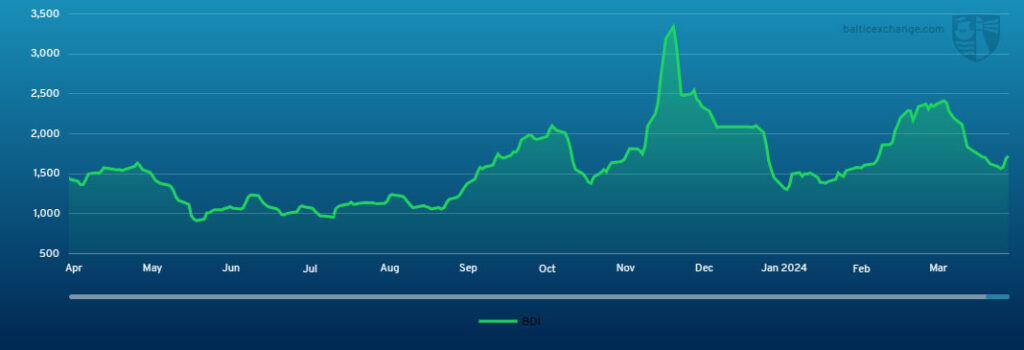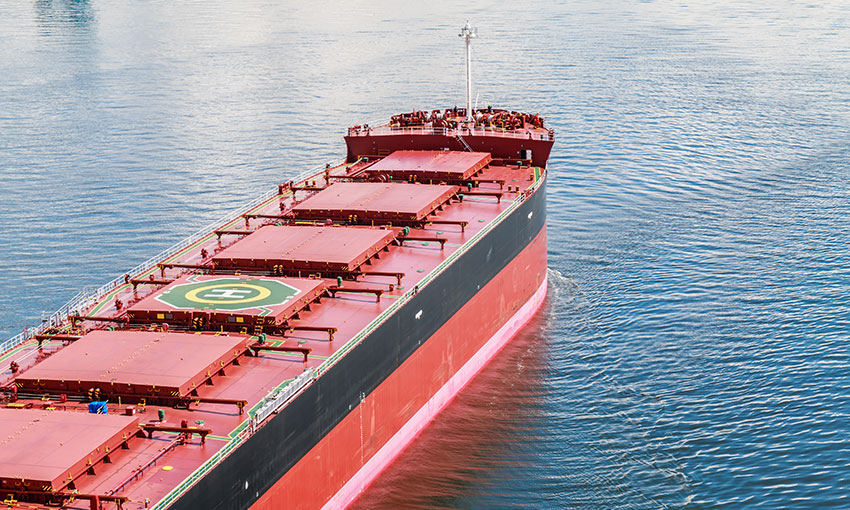THE BALTIC Dry Index dipped slightly in the first part of the week before a rebound. The week began with a BDI of 1594, and ended it at 1729.

Capesize
At the beginning of the week, the Pacific market showed promising activity with healthy cargo volumes. However, despite this, conditions slightly weakened, and the Atlantic market remained subdued, as the week got underway. Nevertheless, as the week progressed, the Pacific market saw increased activity, particularly before the Singapore holiday, with C5 stabilizing around the US$8.90 mark.
Meanwhile, the Atlantic market continued to lag behind, with minimal engagement and limited discussions. Despite a quiet day during the midweek holiday in Singapore, there was a positive turn as the market rebounded, reflecting growing confidence. Improved timecharter fixtures led to substantial surges in the C10 and C5 indices, signaling a positive momentum shift. Similarly, the Atlantic market showed signs of improvement, with a widening gap between bids and offers as the bids began to improve. Overall, it has been a positive end to the week as evidenced by the BCI 5TC rising by US$641 to close at US$21,164 having started the week at US$18,226.
Panamax
A mixed week, the opening part returned weaker rates only to find some impetus mid-week to flatten out as the week ended. In the Atlantic, a pick-up of grain demand mid-week both from South and North Coast South America drove rates forward, an 81,000-dwt delivery North France achieving US$23,000 for a trip via NC South America redelivery Far east. The north of the arena by comparison lacking demand but weirdly saw a tightening tonnage count to leave rates in the balance.
Asia blighted by various holidays had a muted feel but we end with solid demand appearing primarily ex Australia, a scrubber fitted 82,000-dwt delivery China was heard fixed at US$15,000 for a trip via EC Australia redelivery India and with firm sentiment emanating from the South Atlantic rates would have appear to be supported. Limited period fixing; however, an 82,000-dwt delivery China was heard fixed basis six to nine months at US$18,000.
Ultramax/Supramax
Mixed blessings for the owning side this past week, whilst the Atlantic appeared rather positional the widespread holidays in Asia saw limited action although sentiment seemingly remained fairly positive with tonnage supply remaining relatively tight. From the Atlantic better levels were seen from the US Gulf but from the South Atlantic it remained finely balanced.
There was also more fresh enquiry from the Mediterranean and Continent. A 60,000-dwt open US Gulf was heard fixed for a trip via Red Sea redelivery Port Said. A 63,000-dwt open North Continent was also heard fixed for a trip via the Baltic to South Africa at US$18,500. From Asia, a 57,000-dwt fixed delivery passing Hoping trip via East Kalimantan redelivery WC India at US$10,000. Whilst a 53,000-dwt fixed delivery Singapore trip via Indonesia redelivery China at US$12,750. More activity surfaced from the Indian Ocean, a 63,000-dwt fixing delivery Port Elizabeth trip redelivery China at US$22,500 plus US$225,000 ballast bonus.
Handysize
In a week with more holidays across large portions of the globe due to Eid, visible activity remained muted. In the South Atlantic, limited cargo availability remained an issue for Owners and a 32,000-dwt was rumored to have been fixed for a trip from Recalada to Algeria with an intended cargo of grains at US$16,500 whilst a 37,000-dwt opening in Nueva Palmira was rumored to have failed on subject’s basis delivery when we’re ready via the River Plate to Algeria at US$18,500. There were unconfirmed rumors on the Continent of a 37,000-dwt fixing from the French Bay to North Coast South America at around US$10,000 but further details had yet to surface. In Asia, cargo availability from Australia and Indonesia remained limited, keeping levels soft for tonnage in the region, with a 37,000-dwt opening in EC India being fixed basis delivery passing Singapore via Australia to North China with an intended cargo of grains at US$11,000.
Clean
LR2
In the MEG this week LR2 freight continued to crumble this week. The TC1 rate for 75kt MEG/Japan dropped a further 26 points to WS162 and the 90kt MEG/UK-Continent TC20 voyage also dipped to the tune of circa US$640,000 to US$4.9 million
West of Suez, Mediterranean/East LR2’s saw a 10% drop of US$441,000 to US$3.83 million.
LR1
In the MEG, LR’1 freight also remained on a downward trajectory this week. The 55kt MEG/Japan index of TC5 went from WS224 to WS189 exactly 1 month on from when it breached over WS200. The 65kt MEG/UK-Continent of TC8 shed another US$614,000 to US$3.99 million.
On the UK-Continent, the 60kt ARA/West Africa lost eight points to go sub WS200 and is currently at WS198. At these levels earnings are still US$37,000 per day on Baltic description round trip.
MR
MR’s in the MEG also felt the pressure from the larger vessel markets in the region. TC17 35kt MEG/East Africa lost 29 points to WS280.
On the UK-Continent MR’s were subject to downward retesting this week. The 37kt ARA/US-Atlantic coast of TC2 came down 17 points to WS184. On a TC19 run (37kt ARA/West Africa) the index also had a 26 points cut out from it, to its current level of WS212.
As with the Continent the USG MR’s have come down over the last week. TC14 (38kt US-Gulf/UK-Continent) lost another 11 points of value down to WS194. The 38kt US Gulf/Brazil on TC18 went from WS291 to WS279 and the 38kt US-Gulf/Caribbean of TC21 went below US$1m dropping 15% down to US$950,000.
Handymax
In the Mediterranean, 30kt Cross Mediterranean (TC6) had a hefty 53 point (22%) drop to WS190.
Up in North West Europe, the TC23 30kt Cross UK-Continent improved 11 points to WS228. Taking the Baltic round trip TCE to just under US$30,000 per day.
VLCC
The market slacked off slightly this week. The rate for 270,000 mt Middle East Gulf to China lost three points to WS61.95 which corresponds to a daily round-trip TCE of US$38,241 basis the Baltic Exchange’s vessel description.
In the Atlantic market, the 260,000 mt West Africa/China trip eased by 2.5 points to WS62.72 which shows a round voyage TCE of US$39,629 per day The rate for 270,000 mt US Gulf/China is assessed US$65,500 lower at US$8,399,500 translating into a round-trip daily TCE of US$39,716.
Suezmax
The Suezmax market in West Africa was boosted by a tightening position list and a busy US export market enticing West Africa players away. For the 130,000 mt Nigeria/UK Continent voyage rates steadily rose 22 points over the week to WS129 (a daily round-trip TCE of US$52,733). In the Mediterranean and Black Sea region rates climbed about 13 points to a little over WS122.5 for the 135,000 mt CPC/Mediterranean trip (showing a daily TCE of about US$47,810 round-trip). In the Middle East, the rate for 140,000 mt Middle East Gulf to the Mediterranean (via the Suez Canal) was assessed flat at just below WS100.
Aframax
In the North Sea, the rate for the 80,000 mt Cross-UK Continent recovered nine points to WS140.07 (a daily round-trip TCE of US$39,297 basis Hound Point to Wilhelmshaven).
In the Mediterranean market the rate for 80,000 mt Cross-Mediterranean shot up over 34 points to WS203.56 (basis Ceyhan to Lavera, that shows a daily round trip TCE of US$64,575).
Across the Atlantic, the Stateside market has continued climbing once again. The rate for 70,000 mt East Coast Mexico/US Gulf (TD26) has had 81 points added to last Friday’s rate, standing now at WS240.63 (a daily TCE of US$69,025 round trip) and the rate for 70,000 mt Covenas/US Gulf (TD9) is now 75 points higher than a week ago at WS 228.75 (a round-trip TCE of US$58,648 per day). The rate for the trans-Atlantic route of 70,000 mt US Gulf/UK Continent (TD25) is 35 points firmer week-on-week at WS224.44 (a round trip TCE basis Houston/Rotterdam of US$56,454 per day).
LNG
The slow start after easter has hungover into the new week, LNG shipping on spot remains very flat. Few fixtures or cargoes reported while inventories remain full there is little need to move any product from facilities. Ship length is growing and interest in Period, be it six months or longer is quiet – with brokers reporting that if fixing six months you shall be free only in the lead up to the winter market and could therefore miss the uptick in spot so owners are wary.
Rates were extremely flat with the BLNG1 Aus-Japan for both the 160cbm and 174cbm indices moving little, the 174cbm lost US$28 to finish at US$47,268 while the 160cbm lost US$104 to finish at US$30,762. Across the Atlantic both routes moved more, but barely. BLNG2 Houston-Continent shed US$603 and US$481 on the 160cbm and 174cbm ships respectively giving a final publication of US$33,609 on the 160cbm and US$44,807 on the 174cbm. The BLNG3 US-Japan fared worse losing nearly US$2000 on each ship, these closed at US$39,457 on the 160cbm and US$51,427 on the 174cbm.
Period didn’t move at all and our assessments remained at US$62,600 for 6-month, US$77,133 for 1-year and US$80,400 for a 3-year period.
LPG
Another week of fixing fatigue, the market has barely moved with rates hovering within US$1-2 on all three routes. Some MEG Acceptances were released at the end of the week which may amp up any fixing but as we close the week out there is very little to report. BLPG1 Ras Tanura-Chiba moved a total of US$0.07 cents over the week a close of US$64.143 and a daily TCE earning of US$44,277, this meant that our closing rate repeated three times within the week, a first for over a year.
BLPG2 Houston-Flushing managed to open and close the same value with a small rise mid-week and then a softening overall, there is little to report but a close of US$67.8 and a daily TCE earning of US$67,113. BLPG3 Houston-Chiba had the greatest movement this week moving a total US$0.78 nearly a whole dollar. A close of US$125.357 and a daily TCE earning of US$50,399 means fixing levels aren’t too bad compared to some of the rates earlier in the year, but there is little going on and a steady supply of ships so sentiment, a big driver in LPG, could turn more bearish should cargoes not start working May.

